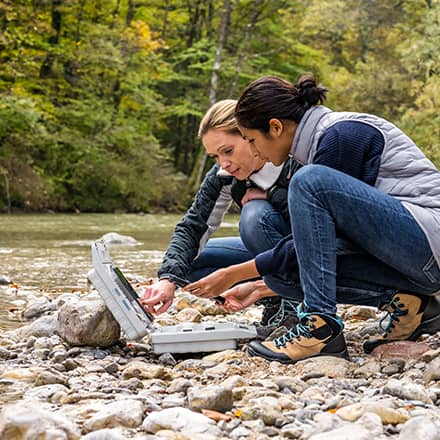
Change Your Environment with an Environmental Science Major
Learn how to think and act critically and creatively to tackle important environmental challenges with an environmental science degree from Southern New Hampshire University. With the Bachelor of Science in Environmental Science, you'll examine today's most vital environmental topics, including climate change, alternative energy, sustainability and the loss of biodiversity.
See Yourself Succeed as an Environmental Science Major
Through coursework, research, independent study and working closely with your professors, you'll gain the communication, interpersonal and technical skills needed to make a difference in the world. Whether you choose to work for a private company, nonprofit or governmental agency, or continue your studies at the graduate level, you'll leave prepared to meet the growing environmental challenges around the world. Highlights specific to this BS program include:
- Numerous field research opportunities on and off campus
- Faculty-led domestic and global learning experience opportunities
- Small classes that foster individual learning, independent study projects and internships to fit your career goals
As a private, nonprofit university, SNHU has one mission - to help you see yourself succeed. The benefits of majoring in environmental science at SNHU include:
- Supportive community. Join the SNHU campus community of students who are closely connected with faculty and staff dedicated to your success
- Affordability. It’s our mission to make higher education more accessible. That’s why, SNHU is one of the most affordable private, nonprofit universities in New Hampshire.
- Accessible faculty. Learn from highly credentialed faculty who are experts in their fields and interact with you in the classroom, dining hall, fitness center and the stands
- Opportunity. Tap into our nationwide network of alumni and strong connections with employers for internship and career opportunities
- Campus experience. Enjoy more than 50 student clubs, champion Division II athletics and fun events on our 300-acre campus in Manchester, N.H., named a "Best Place to Live" by Money magazine
Internships & Outcomes
With employment opportunities for environmental scientists and specialists expected to grow by 8% between 2020-2030, according to the U.S. Bureau of Labor Statistics, earning a college degree in environmental science prepares you to capitalize on the growing need for highly skilled environmental professionals.1
Regardless of your particular area of interest, the program gives you the technical expertise and interdisciplinary knowledge base you'll need to address multifaceted environmental challenges creatively and analytically. As an undergraduate environmental science major at SNHU, you'll learn how to:
- Demonstrate effective oral and written communication necessary to construct, evaluate and present solutions to environmental problems
- Describe the structure and function of ecological systems and the interfaces between human and natural systems
- Construct solutions to environmental problems using interdisciplinary approaches
- Demonstrate thorough competence in understanding quantitative and qualitative research methods as applied to questions related to the natural environment
- Apply comprehensive concepts and practical experience to ethical issues related to environmental science
- Prepare for the challenges and expectations of graduate degree programs and/or environmental careers
Curriculum
The environmental science curriculum is based on a solid foundation in the natural and physical sciences, so you gain a broad-based interdisciplinary skill set that companies and organizations are looking for to solve complex environmental problems. Because your professors are passionate about environmental issues and bring specific expertise to the program, you can delve deeply into subjects that most interest you.
Courses To Prepare You For Your Life & Career
SNHU's bachelor's in environmental science program includes:
- General education courses
- Degree-specific courses
One course in the program – IT-242: Introduction to Geographic Information Systems – can only be taken online.
General Education Program
SNHU's required general education program, known as The Commons, aims to guide you toward success in not only your academic career, but your personal and professional life too.
Throughout the curriculum, you'll gain some of the most in-demand skills in today's workplace, including:
- Research and information analysis
- Diverse audience communication
- Critical thinking and ethical problem solving
- Leadership, emotional intelligence and collaboration
This expertise will prove practical, transferable and invaluable as you grow in your career and contribute positively to society.
Beyond foundational skill development, the general education program also provides the benefit of allowing you to explore a wide range of fields outside of your intended major.
| View Full Curriculum in the Catalog |
|---|
| BS in Environmental Science |
| Courses May Include | ||
|---|---|---|
| BS in Environmental Science Campus | ||
| BIO 120 | General Biology I | General biology course that includes mammalian cell structure and function, cellular reproduction and physiology, and Mendelian genetics. Laboratory exercises (BIO 120L) to follow lecture topics. |
| BIO 120L | General Biology I Lab | Laboratory course to follow topics presented in BIO 120. |
| BIO 315 | Ecological Principles and Field Methods | This course introduces students to the principles of ecology and practical methods used in the field. Students will explore theoretical topics in the ecological systems including the level of the population, community and ecosystem; energy flow and biogeochemical cycles; and the concept of sustainability. Students will read literature and conduct research projects in the field and will use critical thinking to evaluate research, design studies, present findings and debate on the issues. |
| IT 242 | Introduction to Geographic Information Systems | This course is designed to introduce the student into the exciting new world of mapping software. Mapping software has found many uses throughout government, universities, business, as well as in the public policy arena. Students will learn how to use mapping tools that are available with data driven web sites, as well as learn how to create their own maps with mapping software. Students will learn how to work with different kinds of data sets and how to incorporate them into customized maps for analysis and presentation. IT-242 is only offered online. |
| ENV 101 | Environmental Science | This course provides an introduction to the scientific aspects of the environmental field. The first part of the course introduces students to the foundations of environmental science, while the second part concentrates on the application of these foundations to real life environmental problems. Therefore, the course not only engages the fundamentals of environmental science but also shows students how science informs sustainability, environmental policies, economics and personal choice. |
| ENV 220 | Field Methods and Technologies | This course introduces students, interested in environmental field work, to the tools and technology of the profession. Students will read and discuss primary literature that use these techniques and will participate in hands-on activities to improve their skills. Main topics of the course will be the use and application of multiple environmental field research techniques and statistical and data analysis software. |
| ENV 250 | Environmental Science Research Methods | This course provides students with an understanding of how to evaluate, conduct, write and design research. Required for environmental science majors, it introduces the why, when and how quantitative and qualitative methods are used as investigative tools. The course follows the scientific method and focuses on how to search the literature, write a literature review, formulate research questions/hypotheses, and design experiments to test these hypotheses. We will also explore qualitative methods and discuss their use in the field with special attention to conducting interviews, case studies, and focus groups. Students will prepare a research proposal on a topic of interest. Formulation of this project begins early, forms the basis for a final project, and is presented in a mock scientific conference. |
| ENV 440 | Senior Seminar | This is an issue-based discussion course designed to define and explore the multifaceted consequences of environmental science issues. Several topics will be explored from either long-standing or current environmental science issues. Students are expected to conduct extensive research on relevant topics and communicate their knowledge in both oral and written assignments. |
| PHY 105 | Geology | This course surveys the major themes in geology. Students will examine topics such as plate tectonics, the rock cycle, surface processes, and concept of geologic time. |
| Total Credits: 120 | ||

Campus Undergraduate Tuition
Our Manchester campus aims to keep tuition and related costs low for our students so that you can pursue your degree and your goals.
University Accreditation

Related Articles

What is Information Security? Why It’s Important, Job Outlook and More

How to Become a Game Developer

What Can I Do With an Environmental Science Degree?
References
Sources & Citations (1)
1 Bureau of Labor Statistics, U.S. Department of Labor, Occupational Outlook Handbook, on the internet, at:
- https://www.bls.gov/ooh/life-physical-and-social-science/environmental-scientists-and-specialists.htm (viewed July 21, 2022)
Cited projections may not reflect local and/or short-term economic or job conditions and do not guarantee actual job growth.

